Working up a sweat trying to decide on the right air conditioner?
In many places, cooling has become a necessity for our health and well-being.
We’ve done some research to help you choose the right type of cooling unit at the right price. We’ve narrowed down our search and compared portable ACs to window ACs, taking budget and other factors into account.
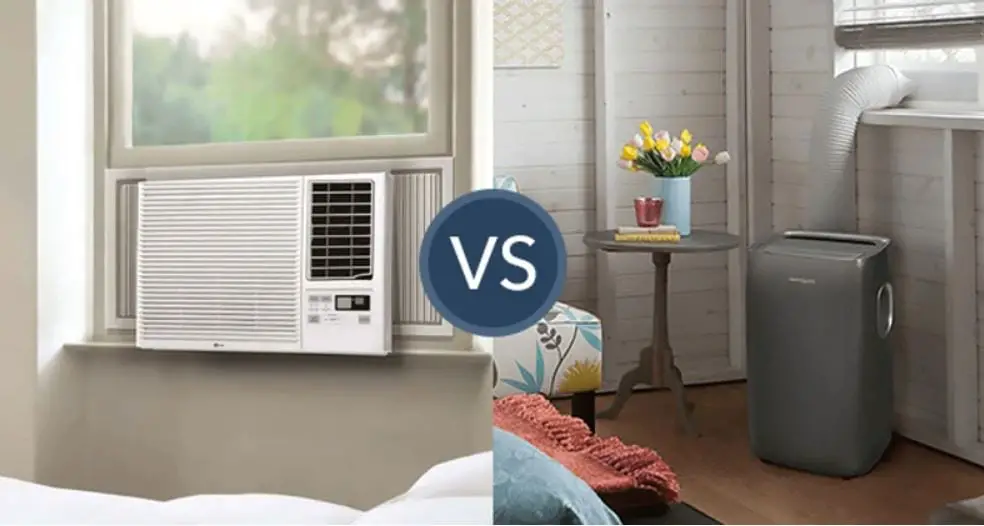
Portable Air Conditioner vs Window AC

Portable Air Conditioner
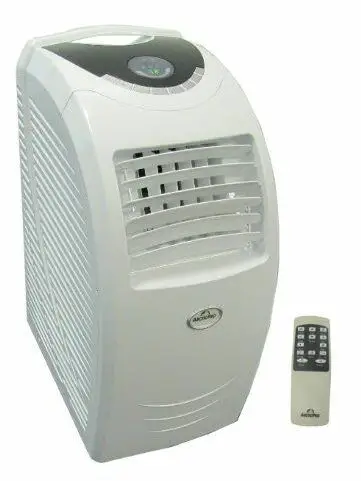
Window AC
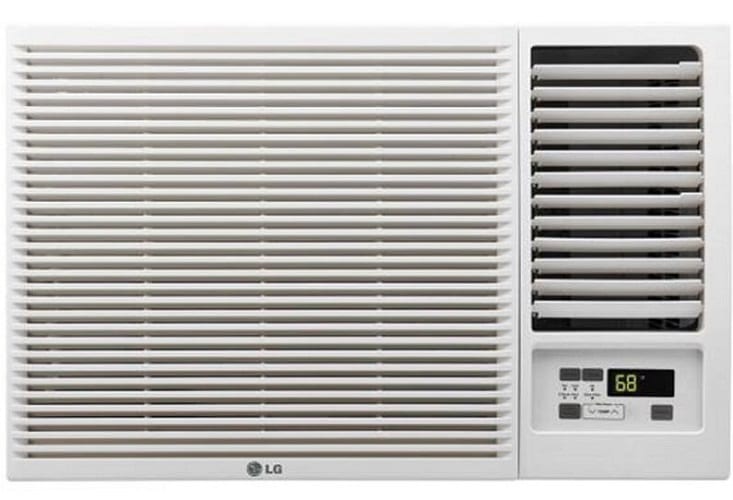
Pros
Portable Air Conditioner
No installation required
Mobile and can be used in different areas
Can be used in spaces without windows
Window AC
Cost-effective
Energy-efficient
Less maintenance
Quieter than portable ACs
Cons
Portable Air Conditioner
Noisier than window ACs
More maintenance requirements
Not ideal in a sunlit or humid area
Window AC
Can’t be moved
Can be unsightly as they stick out of the wall or window
Would need permission to install if you don’t own the property
Best For
Portable Air Conditioner
A small space such as a single office or room or where the unit is required in multiple positions
Window AC
Spaces with windows that need more power but have less floor space
What is a Portable Air Conditioner and How Do Portable Air Conditioners Work?
Portable air conditioners are designed to remove heat and cool the surrounding air in a particular space, also acting as dehumidifiers. They can be moved from room to room as required and come with exhaust hoses that are used to vent hot air out of a window, leaving cool air behind.
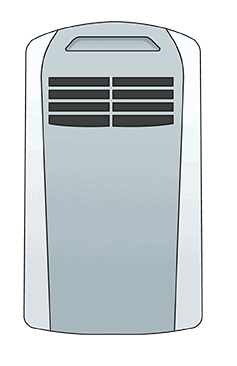
They’re easy to install, and the hoses are flexible and fit various windows. They’re suitable for cooling a specific space rather than an entire office or home space.
Available with either dual hoses or single hoses, the unit draws air from inside and exhausts it outside. Depending on the size of the area to be cooled, a single hose AC is adequate.
The downside is that this creates negative air pressure, and any cracks in the room will allow hot air to leak into the room. The AC has to work harder to keep the room temperature constant.
Dual hose units draw air in through one intake, cool it, and return it to the room. Another hose draws cool air from outside to cool the unit down. The outtake hose exhausts the warm air outside. This process is more efficient, and the unit doesn’t have to work as hard to cool the area.
What is a Window AC and How Does a Window AC Work?
Window ACs aren’t as mobile as portable ACs. Mounted on windows or walls, they’re practical as they take up less space and use less electricity. They’re not as costly as portable ACs, have a compact design, and are just as efficient. They can also be used for heating areas when it gets colder and acts as a dehumidifier.
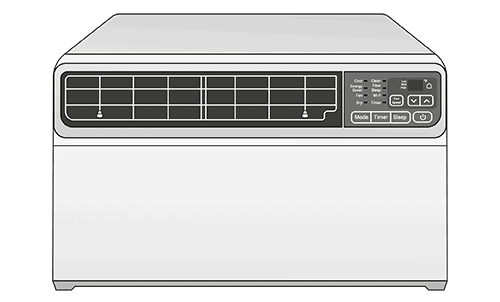
Quieter than portable ACs, these units are, however, not easy to install. If installed incorrectly, this could affect the efficiency of the cooling action and could potentially be hazardous if they fall. It may be worthwhile to pay extra for an expert to do the installation.
The unit works by drawing air from the room, where it’s then conditioned and then discharged outside the back of the unit through a vent. Cool, dehumidified air is returned to the room, reducing the temperature and level of humidity.
Relevant Characteristics Between a Portable Air Conditioner and a Window AC
Portable Air Conditioner vs Window AC
Compare by tapping or clicking below!

Coverage area
Cooling Capacity (*BTU)
Portable Air Conditioner
200 Sq. Ft. – 8,000 BTUs
300 Sq. Ft. – 10,000 BTUs
400 Sq. Ft. – 13,200 BTUs
600 Sq. Ft. – 14,000 BTUs
Window Air Conditioner
260 sq. Ft. – 6,000 BTUs
340 Sq. Ft. – 8,000 BTUs
450 Sq. Ft. – 10,000 BTUs
550 Sq. Ft. – 12,000 BTUs
800 Sq. Ft. – 15,000 BTUs
Noise Level (Decibels)
Portable Air Conditioner
Average 70dB
Window Air Conditioner
Average 50dB
Energy Efficiency (*EER)
Portable Air Conditioner
Average rating 8.5 – 10
Window Air Conditioner
Average rating up to 12+
Cost
Portable Air Conditioner
$270 – $470
Window Air Conditioner
$350 – $550
Installation
Portable Air Conditioner
No installation required
Window Air Conditioner
Difficult to install
Maintenance
Portable Air Conditioner
- Water tank or tray must be emptied regularly
- Replace air filters every three months
Window Air Conditioner
- Water vented through system internally
- Replace air filters every three months
*BTU stands for British Thermal Unit and is the measurement used for the cooling capacity of air conditioners
*EER stands for Energy Efficiency Rating, which is calculated by dividing BTUs by Watts
Similarities and Differences
Summers are becoming hotter and lasting longer, and for our well-being and health, it may be necessary to invest in an air cooling system. Selecting the wrong air conditioner for your space could end up being a costly exercise. In this section, we compare significant differences and similarities between portable and window air conditioners.
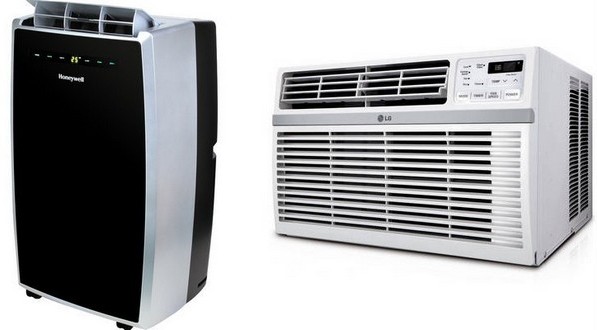
Portable Air Conditioner and Window AC Differences
There are significant differences between the two, and they are:
Installation
In terms of installation, the portable unit is the simplest and least obtrusive, while the window AC could prove to be unsightly as it sticks out visibly through the window. Being mobile, the portable unit can be used in different rooms, whereas the window unit will more than likely remain where it is once installed. It’s possible to install window units through walls.
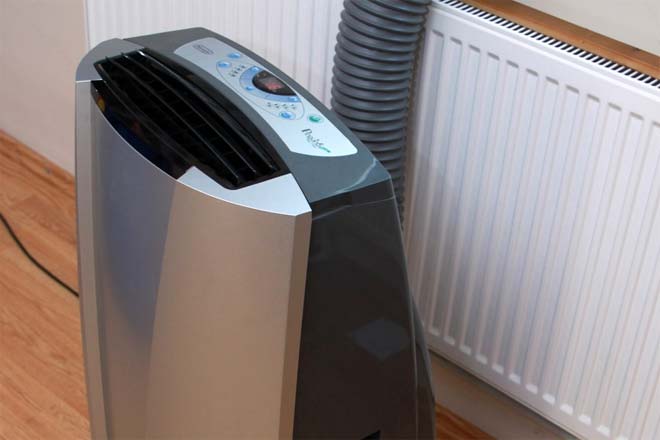
Cooling Capacity
Some factors are affecting the cooling capacity of both units, such as the size of the area, the amount of sunlight it attracts, and the level of humidity. To select the right size AC, we calculate the size of the room requiring cooling and select the BTU accordingly. This is calculated using British Thermal Units (BTUs). The higher the rating, the larger the cooling space and size of AC required.
Energy Efficiency
National standards require a minimum Energy Efficiency Rating (EER) of 8.0. EER is the ratio of the unit’s cooling capacity to the energy it uses in Watts. (BTUs/W = EER). The higher the rating, the more efficient the cooling capacity of the unit. Both types are essentially energy efficient as they’re used to cool a specific space, instead of an entire house or office.
Water Efficiency
Both portable and window ACs use the same cooling system, which generates water. Condensation is caused by warm air being cooled by the evaporator coil, which causes dripping. This water collects in a drip tray that must be emptied regularly with a portable AC, whereas with a window AC the water just drips outside at the back of the unit, which is much easier in terms of maintenance.
Noise
Noise levels depend on the make and model of the AC. All units make a level of noise so it’s wise to research the level of decibels of each unit before making a decision. Generally, window ACs tend to be quieter than portable ACs.
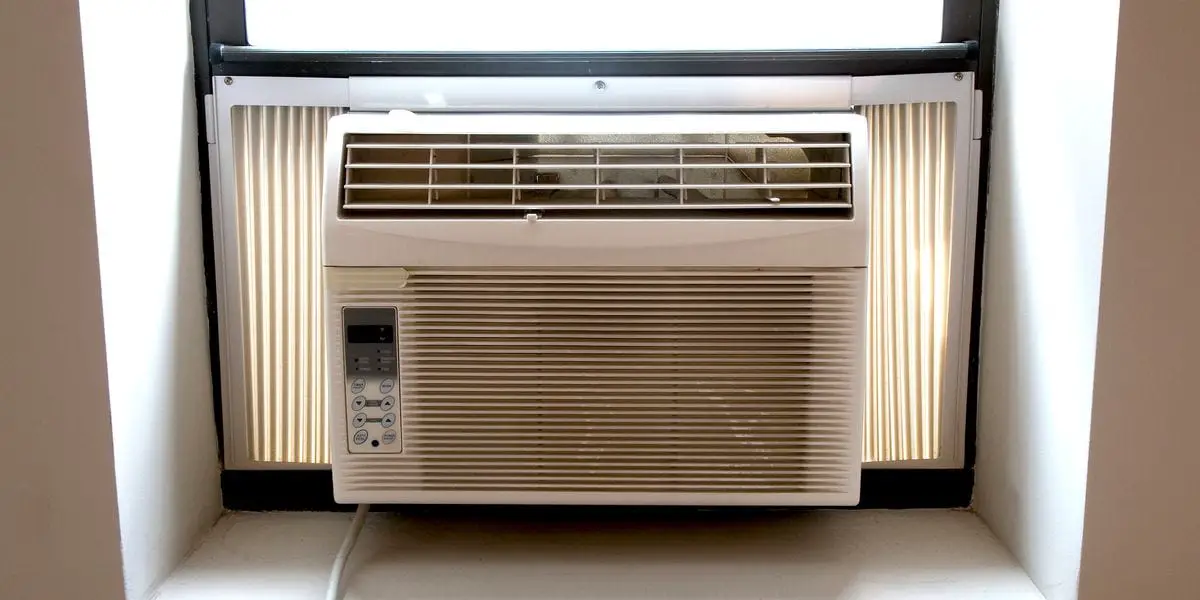
Maintenance
Maintenance is almost always required to ensure the continued efficiency of anything with working parts. Window ACs can dehumidify without requiring a tray for the collection of water generated as part of the process. Portable ACs need water trays to be emptied regularly and the entire unit should be cleaned twice a year. A window AC should be cleaned at the start of the cooling season, making these units easier to maintain.
Cost
Budget comparisons show that window AC prices can be compared to a portable AC the next size up. Similarly, a smaller window AC will cool the same space as a larger portable AC. Once again, we consider the size of the area to be cooled when comparing the pricing and efficiency of various ACs.
Portable Air Conditioner and Window AC Similarities
The two options are relatively close with regards to:
Installation
As portable ACs don’t require installation and are easy to move from one space to another, making them more practical than window ACs. Correct installation is important where window ACs are concerned from both an efficiency and safety point of view, making installation more complicated than that of portable ACs.
Cooling Capacity
The cooling capacity of both units is affected by the size of the area being cooled, how much sun the area receives, and the level of humidity. The energy efficiency of the unit will determine its cooling capacity.
Energy Efficiency
When choosing an AC unit, you should look for the EER sticker prevalent on most ACs. National standards require all ACs to have a minimum rating of 8.0. The benefits of higher ratings are:
- Lower energy bills
- Environmentally friendly
- Increased cooling efficiency
- Better quality parts
Noise
Both portable and window ACs are noisy, however, the better quality window ACs have proven to be slightly less noisy than portable ACs.
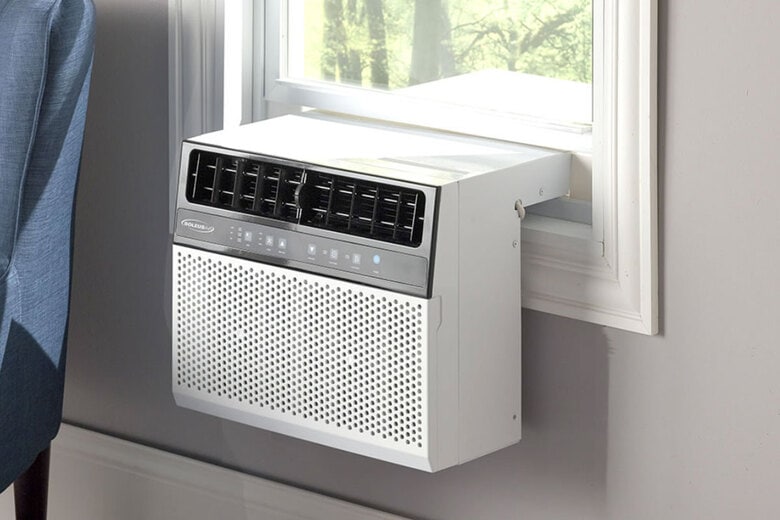
Maintenance
Both require maintenance, although the window AC doesn’t require the removal of water trays as do the portable units.
Cost
A smaller window AC will provide the same cooling capacity as a larger portable unit, making it easier to cool larger spaces, so comparatively they’re priced similarly.
Generally, it appears that both portable and window ACs offer similar cooling and energy efficiency, affected by the same factors, such as the size of the area, direct sunlight, humidity, and access to venting.
Advantages of Portable Air Conditioners
What are the advantages of choosing a portable AC? If you live in a small space, or a space with multiple rooms where you wish to cool only specific areas, a portable AC may be your answer. They also act as supplementary coolers when temperatures rise and larger central heating systems are perhaps not sufficient.
These units require no installation, aside from the hoses that can be easily attached to windows or viable exits such as doors and sliding doors. If you’re renting you won’t have to ask permission from your landlord to install a unit that may otherwise prove unsightly and if you move you simply take your AC with you.
They’re extremely versatile and can be moved from room to room with relative ease as required. Saving money, they cool only specific areas instead of an entire house or office. If an area receives direct sunlight, it’s easy to move them to a more shaded spot, increasing its efficiency.
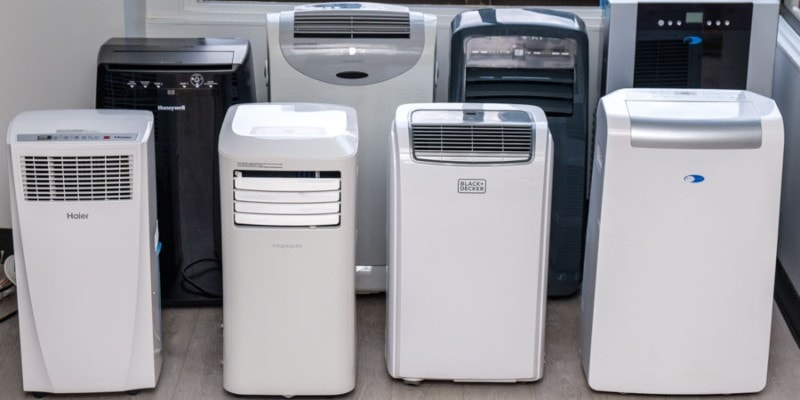
They come in handy at night when the heat becomes unbearable and you can move the unit from your living area to your bedroom. They can also be packed away when not in use, increasing the available space in your living areas.
Energy-efficient, portable ACs will save you on installation costs. Now available in modern designs, portable ACs are far more attractive. No longer an eyesore, they don’t block your view or natural sunlight as do window ACs.
Advantages of Window Air Conditioners
What are the advantages of choosing a window AC? These units are more powerful than portable ACs and a smaller unit will cool the same size area as a larger portable AC.
With good energy efficiency properties, window ACs are also extremely cooling efficient and cover an area equal to that of their power. A smaller window AC will have the same cooling capacity as a larger portable AC.
Acting as coolers and humidifiers, window ACs allow excess water collected to drip outside from the back of the unit, therefore there’s no need for drip trays or hoses or regular cleaning and emptying.
If you have the right space and window area, these units are compact and out of the way, leaving your living area clear.
Window ACs can be less noisy than portable ACs, depending on the make and model, and are generally less expensive, depending on the size, make, and model.
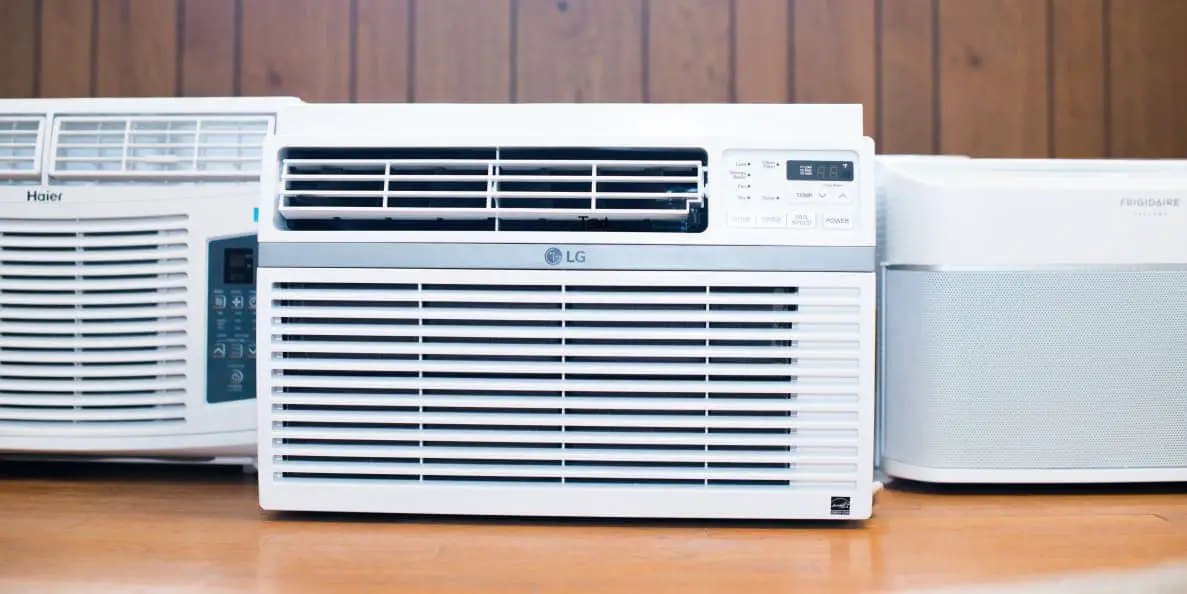
What About Split Air Conditioners?
Split ACs are an alternative AC for cooling purposes and are used for larger areas or multiple rooms where cooling requirements are higher.
Mounted on a wall, the unit comes with two separate units, one inside the room and the other outside in a convenient position. These are connected by air pipes that move air from the outdoor to the indoor unit.
They’re extremely efficient when it comes to lowering and maintaining cooler room temperatures and consume less power. They’re also quieter than other AC types, as the noisiest parts are located in the outside part of the unit.
Considered to be energy efficient, split air-conditioners are a popular choice due to various factors. Easy to maintain, they take up less space than window ACs, and as they’re controlled by remote control and a thermostat, it’s possible to set different temperatures in different areas, thereby saving energy and money.
However, installation should be done by a qualified engineer and the unit is costlier than portable and window ACs.
Additional Cooling Factors for Portable and Window ACs
For an AC to function optimally, one should ensure that the room being cooled is well insulated. Leaks and cracks will necessitate a more powerful AC and use more energy as they work harder to maintain a cool temperature.
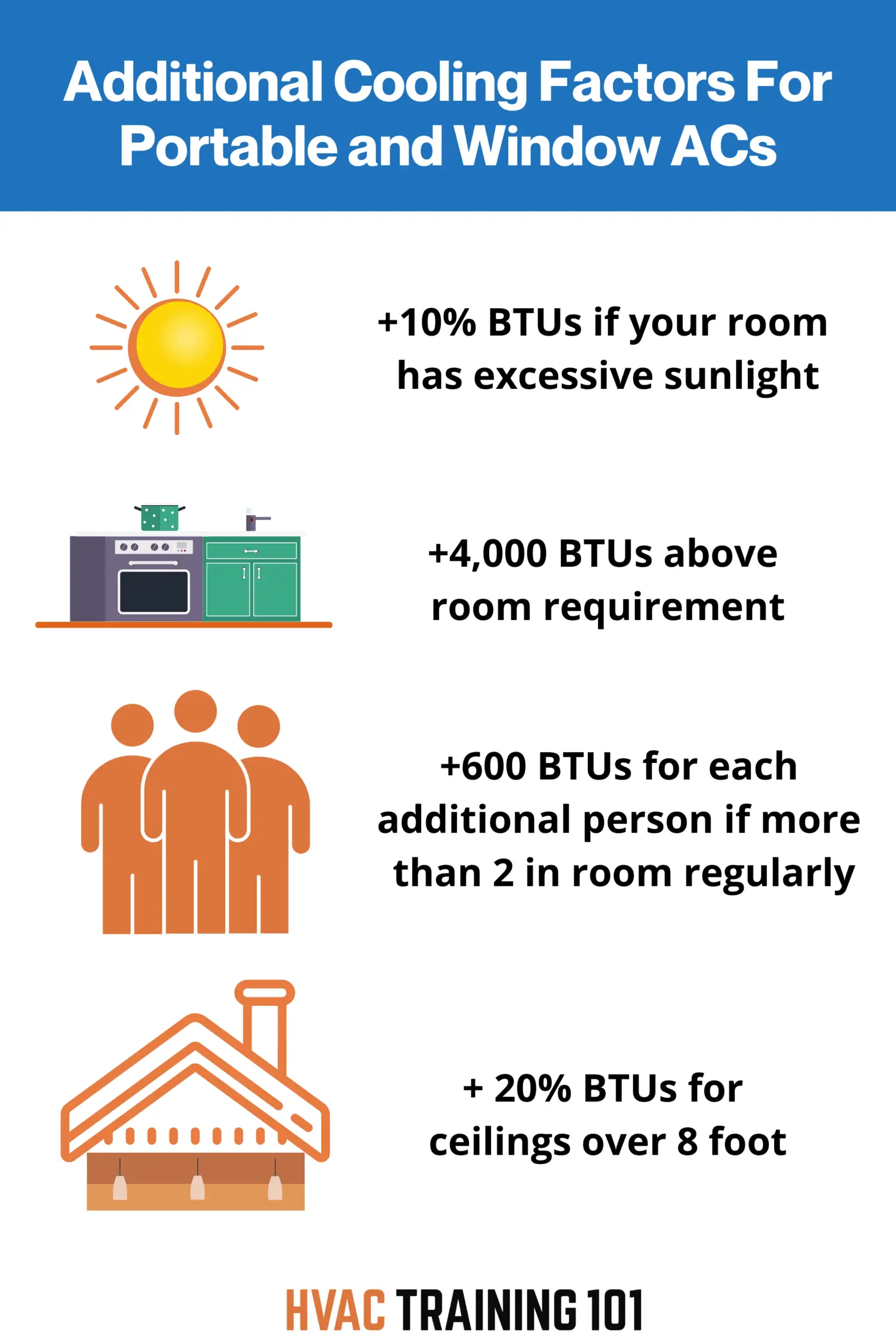
A well-insulated room will also cost less to cool and a smaller AC will be adequate.
Direct sunlight will also affect the size AC required, whereas a well-shaded room will require a smaller AC. Alternatively, a portable AC can be placed in a shaded area of what are otherwise sunny areas of your living space. Kitchens tend to generate more heat than other rooms, which also increases the need for more cooling capacity and a more powerful unit.
The number of people that frequent a room regularly should also be taken into account, as the more people there are in a room, the warmer the room. Fewer people can make a room feel cooler. It’s recommended to add 600BTU for every person frequenting a specific room.
If you prefer a window AC, you would need to ensure that there’s a suitable window or wall space for installing the unit, and ensure that you’re legally allowed to install an AC if you’re only renting. On the other hand, if you prefer a portable AC, make sure that there’s a viable area for the hose to vent, such as a window or door.
These are all factors to be taken into account to ensure that you choose the most effective AC for cooling a particular space.
When Would a Portable Air Conditioner Be My Best Choice?
Would a portable AC suit you best? Have a look at the following aspects to help you decide.
Mobility
If you have different areas that you need cooling at different times, portable ACs are convenient for moving around to use where needed.
Areas That Don’t Get Direct Sunlight
A portable air conditioner will have to work much harder in a sunny area, which may shorten the lifespan of the unit. Rooms that get limited sunshine are ideal spots for portable air conditioners. Units can also be moved into shadier spots to avoid direct sunlight.
Spaces With Low Humidity
Areas with low humidity are ideal for portable air conditioners. A higher humidity creates condensation, which may increase the need for regular cleaning of the portable air conditioner. Failure to do so could cause the unit to malfunction.
Smaller Spaces
Portable air conditioners will function efficiently in smaller areas such as apartments or attics. A larger room will be difficult to keep cool. The area must have a window for the hose to expel warm air.
How to Calculate BTUs for Portable AC Graphic
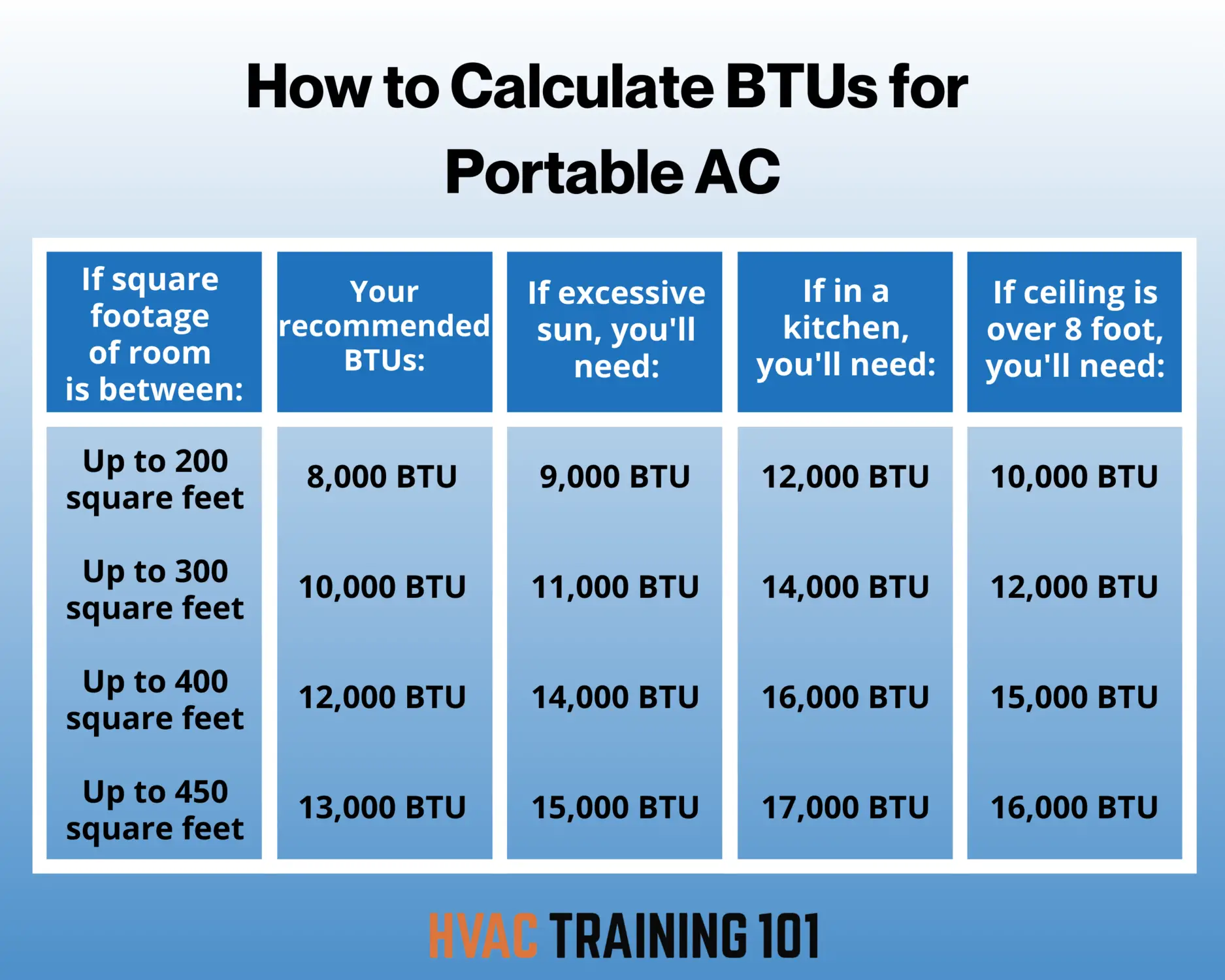
When Would a Window AC Be My Best Choice?
If you’re wondering how to know when a Window AC would be the best choice for you, consider the following factors.
Areas With Limited Space
If you don’t want your AC unit getting in the way, a window AC is your best option. It can also be installed through a wall, which allows you access to your windows.
Areas Where Noise is a Factor
If you want an AC that won’t disturb you or your neighbors, window air conditioners are quieter than portable units.
Limited Area
If you have a specific space you want to be cooled, such as a living room or bedroom, and are happy only to cool that area, the window AC is ideal as it can’t be moved.
Owner of Property
If you own your own property and have a suitable window frame, the window air conditioner is more efficient and less expensive to run. If you’re renting, you would need permission to install these units.
How to Calculate BTUs for Window AC Graphic
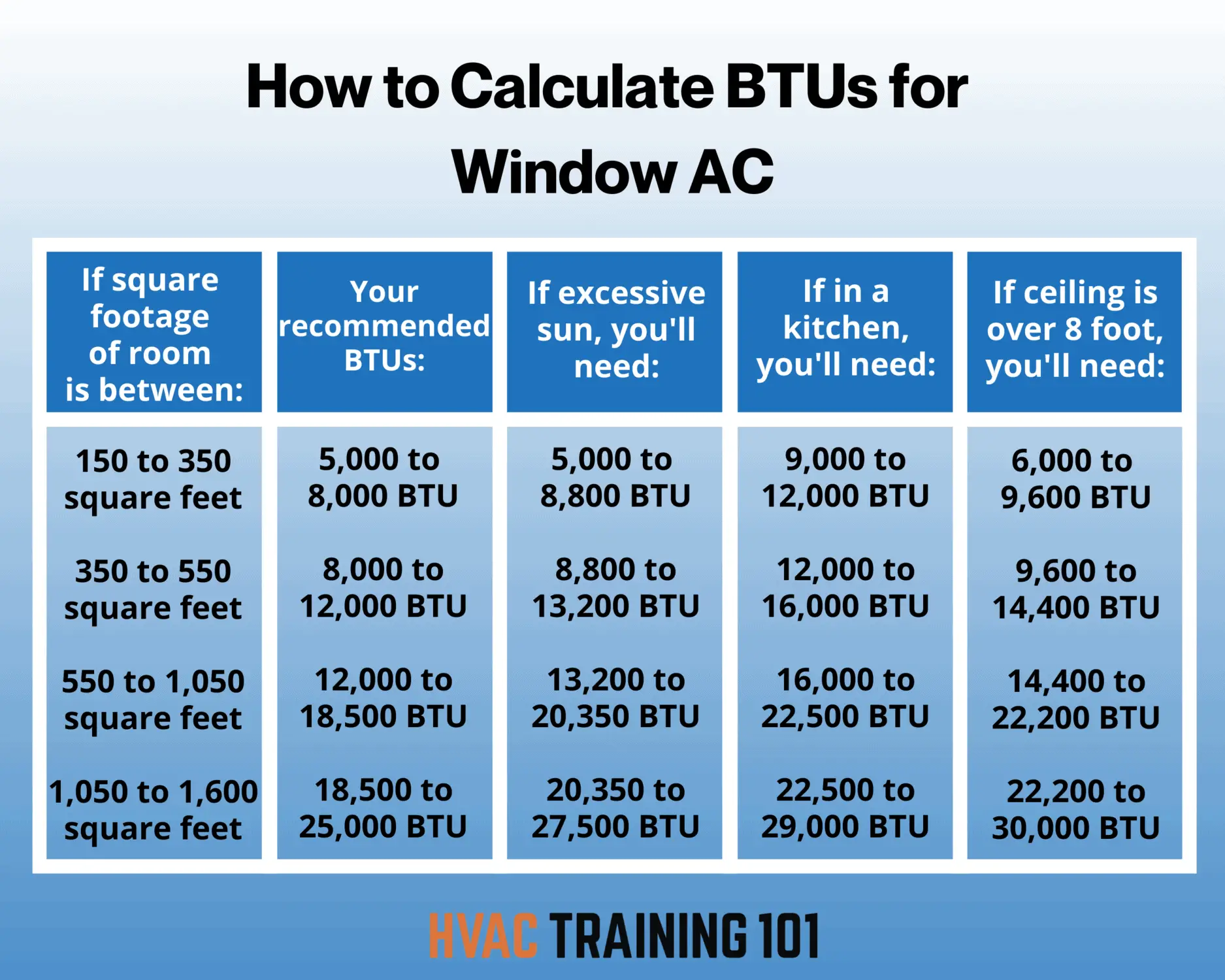
Bottom Line
In summary, if you’re looking for the ideal air conditioner, you should take into account the various factors mentioned, such as space, energy and cooling efficiency, cost, and installation.
Are you using the unit in your home? How many rooms do you want to cool? How many people will benefit? Do you have adequate space?
A portable air conditioner will run efficiently in a small area with low direct sunlight and humidity, as well as offer the flexibility of moving from one area to the next relatively easily. However, for better cooling in larger spaces, an energy-efficient unit that’s cost-effective and quieter, the window air conditioner seems to be the better option of the two.
People Also Ask
These are some frequently asked questions that may assist you in making an informed decision.
Portable air conditioners work most efficiently in smaller spaces where there’s no direct sunlight and lower humidity.
No, portable ACs can also be vented through a door if the unit sits near an exit. Sliding doors in particular are very useful for this purpose.
It’s important to ensure that these units have been installed correctly and is worthwhile investing in getting a professional to do the installation for you to prevent accidents.
No, these units aren’t meant to be used indoors. Window ACs are meant to be installed on windows or through walls as they exhaust warm air outside.
The average cost of running a window air conditioner is between $40 and $100 per year, depending on the make and model of the air-conditioner, how efficiently it’s run, and how hard it has to work.
